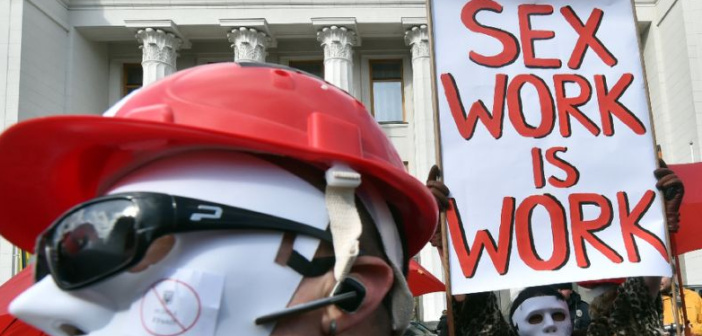“We’re a Risk Taking Population” | An Interview with Sex Workers Alliance Ireland’s Kate McGrew
“They’re trying to make this industry so bad that people will be deterred,” says Kate McGrew, AKA Lady McGrew, an Ohio-born, Dublin-based sex worker, member of Sex Workers Alliance Ireland, rapper, writer and actress. “But they won’t just stop because of that. Half my clients already thought it was illegal.”
Meeting in a Mexican restaurant off South Williams Street on a freezing Friday in January 2016, she agreed to speak with me a fortnight after a heated debate in the Seanad concerning the decriminalising of sex workers and the implementation of the sex buyer laws (signed into law on February 22nd), during which David Norris labelled Turn Off The Red Light a campaign run by “ex-nuns and radical feminists.”
In the Visitors Gallery as a representative of SWAI, the populist line against which she stood clearly left her agitated when I asked whether the imminent change had already created a noticeable shift in terms of clientele, a change evident now, given the spike in crimes committed against Irish sex workers in the twelve months since.
Our meeting, she pointed out was a sign of how the industry was already changing. We had arranged to meet six hours earlier, but she had to postpone the interview after a “two night outcall in a Wicklow cabin” caused delays. “What I am experiencing is certainly clients being more nervous. I’m getting asked for outcalls more.”
“Clients are getting more power. Website reviews carry more weight, which isn’t great. We all have to participate in a review system and everything will probably be streamlined to one website, since it seems clients are going to be paranoid about engaging with people who haven’t been vetted. They’re afraid of being stung. People who don’t have a lot of reviews may be changing their services. They need money, so they might offer more because they see their client base decreasing.”
She deviated for a moment to say, “We’re a risk taking population.”
“We work because we need money. If you have no first-hand experience of the industry, it might be hard to realise that we’ll continue regardless of how dangerous it becomes. So, if we don’t have legal recourse to address any issues, we’re likely to do whatever we can to handle any issues ourselves. That sometimes means bending over backwards for clients. I mean, it’s totally damaging. We have so many reasons now not to interact with authorities. We don’t want to be under their scrutiny and lose out incomes.”

“I was hesitant to say that this is ideologically driven. For a long time, I thought that these people did want to help the vulnerable, but when they threw in the amendments to double fines for indoor workers…”
She pauses, her eyes widen a little and she lets out an exasperated laugh. “Why would they do that? Why? To what end is that? If you’re really saying, ‘these women are victims, we’re looking to end demand, and stop prostitution by targeting clients,’ then what are you doing by adding that amendment?”
“It is clearly ideologically based. They are willing to throw people under the bus. Break a few eggs. Save the people.”
“But the omelette hasn’t been made anywhere.”
Partial decriminalisation, I suggested, seemed a bad idea conceived with the utmost of good intentions. She nodded her head up, down and a little to either side before saying that it was also “devastating” and “counterintuitive.” “It is coming from people who don’t know about the steps of transactional sex.”
Contrary to the perceived end, she says it could give “impunity to perpetrators”, the kind who “rape and rob”; the kind she insists who are not her clients. “Those people will feel safer knowing we have to be alone and can’t go to the police.”
“People don’t trust the police. We want a liaison officer. We’ve asked for one. They have this in New Zealand. There, you hear stories about cops getting a call and walking to a brothel, because a guy isn’t paying, and this cop will take the client to an ATM so the girls can get cash.” Brothel-Keeping legislations, on the other hand will “certainly only strain relationships, because nobody is going to talk to the cops.”
The key to New Zealand’s strength as an alternative model is the Small Owner Operated Brothel (SOOB). “They’re like sex work co-ops. You can run the place yourself. You’ve got health inspectors. You’re dealing with them before cops and it’s officially moved out of the criminal sector and into the labour sector.” These, she insists have contributed to a considerable thaw in worker-police relations.
“Talking to friends working there, they say they have nothing to hide from cops anymore. That’s huge. The things that are illegal remain illegal, such as coercion, but at least we wouldn’t have reason to not interact with police. The same goes for clients.”
On the other hand, when it comes to the Swedish Model, she expressed doubt over the emergence of such a similar rapport, using Norway as an example since it too favours only partial decriminalisation. Drawing my attention towards the case of Galina Sandeva, a sex worker murdered in Oslo, McGrew suggests this could be a sign of things to come. When Sandeva went missing, her friends did not go to police. Instead, they conducted the search themselves. It was only after they discovered her body were the authorities finally alerted.

“There’s a quote from a worker in Oslo who said ‘You manage it yourself to the end, because unless you actually think you’ll die, you won’t go to the cops since you’re afraid you’ll lose everything.’ That’s what you saw with that woman.”
At this point, I raised the matter of a two-year review dismissed in the Seanad debates by Ivana Bacik. “It’s obvious they’re doing this without any base information in the first place. Sweden had reviews in place. They’ve done twenty scope reviews since they brought in those laws” during 1999, with a 2010 report stating, “we can give no unambiguous answer as to whether the industry has increased, or decreased.”
“There’s no evidence,” McGrew insists “that the Swedish model has stemmed trafficking, or has saved women from horrible situations.”
“Hopefully they will give us time to do that research. We’re difficult to research, because we’re disparate. There was a call out for submissions in a newspaper, but we’re not a group of people to read a paragraph in a newspaper and decide, or feel comfortable to write a submission to the government. They need to know their subject. There’s no other topic in the world where decisions are being made for people without engaging with them. It boils down to these scary insinuations, like the idea of false consciousness, where they say, people working don’t really don’t know their own minds. They don’t really know what’s good for them.”
“People don’t accept that such workers can make decisions that are the best thing for them. It might not be great. They might hope not to be doing it someday, but that is the best for them based on some really fucking challenging decisions. To take away that woman’s agency and say she did not consent is really scary.”
Here, she quoted verbatim a Tweet posted by a historian of sex work and sex work policies named Sonja Dolinsek, which in turn was quoted from a UK politics website, which stated,
“If a woman is to be believed when she asserts that she did not consent to sex, she must be believed when she asserts that she did.”
“That is critical, because it’s really a scary thing when they say we can’t consent, because what happens when we say we don’t? Actually don’t? Basically they’re saying, sex workers can’t be raped, you know? It’s totally objectifying and dehumanizing to insinuate that we are victims or that we have no agency, or that we don’t know what’s good for us.”
